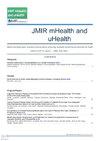Impact of Remote Blood Pressure Monitoring Device Connectivity on Engagement Among Pregnant Individuals Enrolled in the Delfina Care Platform: Observational Study
IF 5.4
2区 医学
Q1 HEALTH CARE SCIENCES & SERVICES
引用次数: 0
Abstract
Background: Patient engagement with remote blood pressure monitoring during pregnancy is critical to optimize the associated benefits of blood pressure control and early detection. Objective: The goal of this study was to compare patient engagement and adherence to RBPM between connected and unconnected BP device users from a prospective pregnancy cohort. Methods: We compared patient engagement with and adherence to remote patient blood pressure monitoring between patients who received a connected and unconnected blood pressure device. Results: Patients with connected devices entered more blood pressure entries and had higher adherence to the remote monitoring protocols compared to patients with unconnected devices. Conclusions: In our study population of pregnant people, we found that “connected” blood pressure cuffs, which automatically sync measures to a monitoring platform or health record, increased adherence to remote monitoring protocols when compared to “unconnected” cuffs that require manual entry of measures.远程血压监测设备连接性对加入 Delfina 护理平台的孕妇参与度的影响:观察研究
背景:孕期患者参与远程血压监测对于优化血压控制和早期检测的相关益处至关重要。研究目的本研究旨在比较前瞻性妊娠队列中已连接和未连接血压设备用户的患者参与度和对远程血压监测的依从性。方法我们比较了接受联网和未联网血压设备的患者对远程患者血压监测的参与度和依从性。结果与使用未连接设备的患者相比,使用连接设备的患者输入的血压条目更多,对远程监控协议的依从性更高。结论在我们的孕妇研究人群中,我们发现与需要手动输入血压数据的 "未连接 "血压袖带相比,"连接 "血压袖带能自动将血压数据同步到监测平台或健康记录,从而提高了患者对远程监测方案的依从性。
本文章由计算机程序翻译,如有差异,请以英文原文为准。
求助全文
约1分钟内获得全文
求助全文
来源期刊

JMIR mHealth and uHealth
Medicine-Health Informatics
CiteScore
12.60
自引率
4.00%
发文量
159
审稿时长
10 weeks
期刊介绍:
JMIR mHealth and uHealth (JMU, ISSN 2291-5222) is a spin-off journal of JMIR, the leading eHealth journal (Impact Factor 2016: 5.175). JMIR mHealth and uHealth is indexed in PubMed, PubMed Central, and Science Citation Index Expanded (SCIE), and in June 2017 received a stunning inaugural Impact Factor of 4.636.
The journal focusses on health and biomedical applications in mobile and tablet computing, pervasive and ubiquitous computing, wearable computing and domotics.
JMIR mHealth and uHealth publishes since 2013 and was the first mhealth journal in Pubmed. It publishes even faster and has a broader scope with including papers which are more technical or more formative/developmental than what would be published in the Journal of Medical Internet Research.
 求助内容:
求助内容: 应助结果提醒方式:
应助结果提醒方式:


